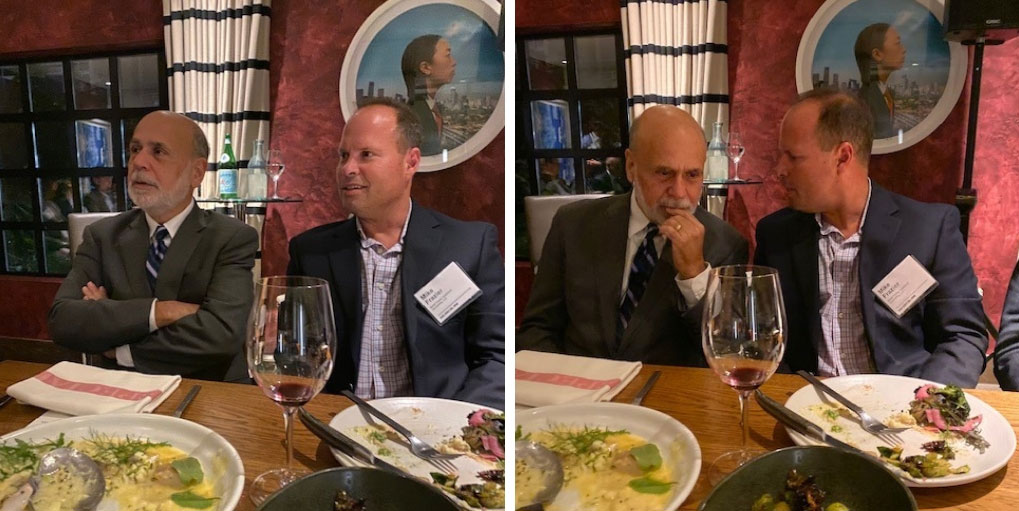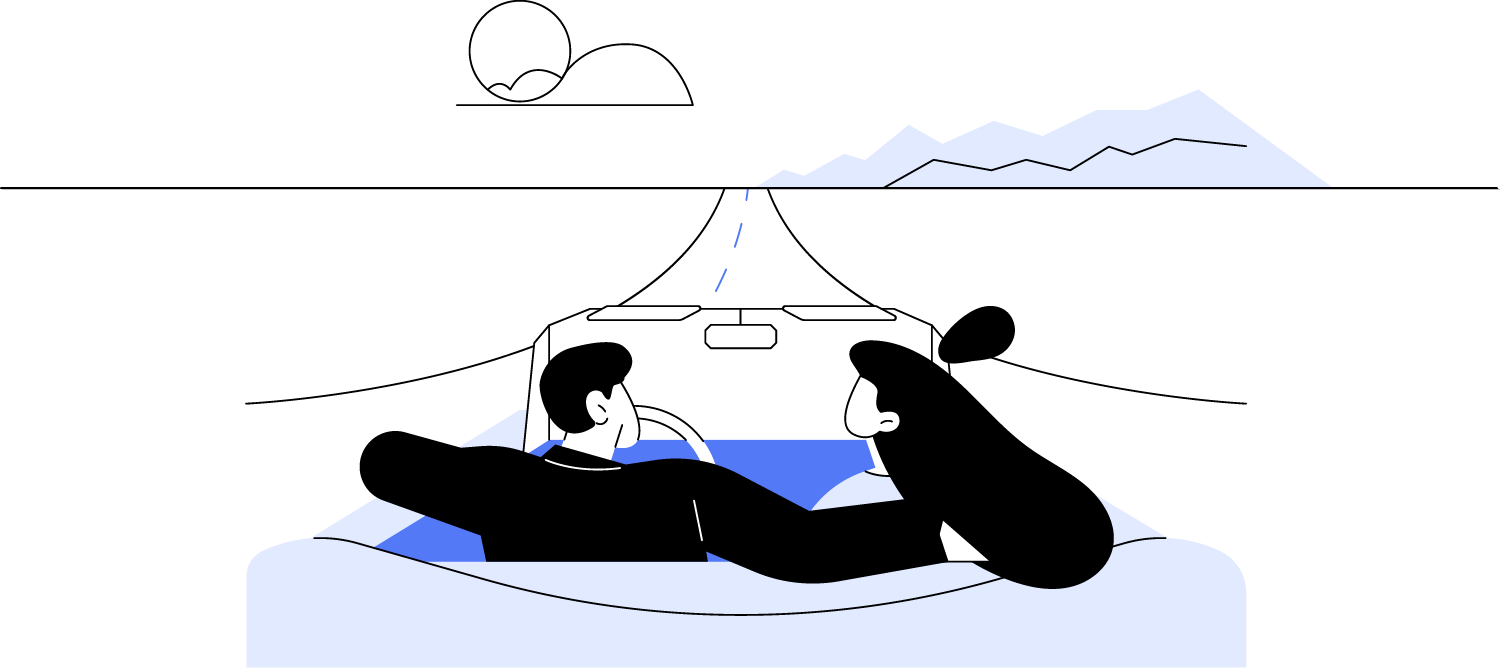Cheap and easy money. That was the answer to the Financial Crisis, or as it is often referred to, the Great Recession. When it appeared that the global financial system was at risk of collapse, central banks joined forces to defend it, using every tool at their disposal. Interest rates went to zero. The Federal Reserve aggressively bought troubled assets, swelling its balance sheet to $4.5 Trillion. Ben Bernanke was the architect and implementer. A decade later, it worked. We are now in the longest economic expansion in recorded American history. Cheap money has dictated this whole 11-year cycle. It still does.
I had the great fortune to meet Dr. Bernanke in 2014, right after he departed the Fed. This week, I had the opportunity to spend time with him again. Prior to heading up the most powerful financial institution in the world, Bernanke was a student and a professor of economic history. His expertise was the Great Depression. His knowledge was paramount. He was the right guy for the job. He leaned on his studies from the past. He had many sleepless nights in that 18 month period of crisis. He felt the weight of the world on his shoulders. There was no guarantee of success. There was no blueprint. It was an experiment. It was controversial. He was even questioned by his predecessors, Alan Greenspan and Paul Volcker. The pressure was massive. I believe Ben Bernanke is an American hero.
It should come as no surprise, Congress was divided on what to do during the crisis. Fiscal stimulus was non-existent. Congress hasn’t agreed on much of anything for decades. Global Markets and the Global Economy were dependent on monetary stimulus. Quantitative easing was the prescription. It was full speed in response to the Financial Crisis.
The experiment was unprecedented. Whatever it takes, was the attitude. Dealing with the consequences down the road was not the issue then. It is now. The unwinding is also unprecedented. The Market seems addicted to the monetary medicine. There was a taper tantrum in 2013. Interest rates spiked and the Stock Market crashed at the very hint of monetary tightening. The Fed raised rates for the first time in 2014. Janet Yellen succeeded Bernanke, and presided over this stage. It created some speed bumps, but the gradual approach worked. The economy continued to grow. Crisis monetary policy was slowly lifted.
President Trump replaced Janet Yellen with Jerome Powell. The current Fed Chair is a Market guy, but not an economist. He’s also a lawyer. After a series of interest rate hikes, cuts have returned. This has also been quite controversial. Rarely does a central bank cut interest rates during an extended economic expansion. It certainly has few precedents to do so with an unemployment rate at 5-decade lows and a Stock Market at all-time highs. It doesn’t leave much in the toolbox in case of another crisis. Powell heard the Market loud and clear a year ago when stocks crashed in December and Treasury rates sunk as the Bond Market soared. The Fed pivot to cut gave the Stock Market what it wanted. The concern is, it wasn’t needed. Corrections are natural and healthy. It’s a necessity within a normal cycle. Preventing them can lead to much bigger problems. The focus continues to be constantly in the now without regard for the costs ahead.
The Stock Market is addicted to the Fed’s magic elixir. Cheap money has sent asset prices soaring. Price still matters. They don’t seem to be pricing in the vast number of negative risks out there, which are macro in nature. They are represented in the global economic slowdown, Trade Wars, Brexit, the Middle East, North Korea, Cybersecurity and impeachment, among others. Another tantrum is likely.
Central banks have become politicized. We see it both at home and abroad. George HW Bush famously said, “I appointed Alan Greenspan and he disappointed me,” as the Fed Chair raised rates before a recession ahead of the 1992 election, which Bush lost. It’s important to point out that Ben Bernanke was appointed by a Republican, George W Bush, and reappointed by a Democrat, Barack Obama. Jerome Powell is a constant target and scapegoat for the current President. The Fed Chair will no doubt get the blame for any decline, economic or Market, as the incumbent seeks another term. Even though Powell stated the hurdle rate is high for the next rate hike, it won’t matter. He’s actually done a pretty darn good job under challenging circumstances. Bernanke agreed.
But there’s only so much central banks can do. The Fed doesn’t have tools to combat trade wars. And even the tools that can work, don’t work all the time. Japan has used quantitative easing for two decades, with underwhelming success. They took interest rates into negative territory in 2014. In negative territory they remain. Europe joined that party too, with negative rates of their own. Bernanke was, to my surprise, ok with negative rates. He didn’t consider them on his watch, but clearly knew it was possible. It’s a bizarre concept of someone willing to pay someone else to hold their money for a period of time. He disagreed. He described the concept with a metaphor of a squirrel storing nuts for the winter and willing to pay a nut or two for the storage fee. Well, ok. But that undercuts the time value of money, depending on the period. The debate goes on…
Of course, there are always unintended consequences of desperation. We should expect more experimental monetary policy tactics. They will most likely come from foreign central banks first, but the Fed’s recent action with the Repo Market raised some flags. There’s a new leader in Europe, but she’s a very familiar face. Her name is Christine Lagarde. She is both Lawyer and Politician. She used to run the IMF. She is apparently open to new ideas as she leads the next stage of the experiment across the pond. What could be next? Helicopter money? A Green QE? Infrastructure spending by the Fed? Wiring money directly into all citizens’ bank accounts? That would certainly be another way to inject stimulus into the system. It would have to have an expiration date to prevent cash hoarding. These are real possibilities being discussed behind closed doors. To be clear, Ben Bernanke did not mention these.
The former Fed Chair believes that for now, the US Economy will continue to grow at a slow rate, and with next to no inflation, interest rates will stay low and central banks will remain accommodative. He doesn’t envy our current Fed Chair’s job and persistently pushes the need for Fed independence, something that Powell asserts daily. Bernanke has never met President Trump and said he has no plans to either. A huge baseball fan, having grown up in South Carolina and residing now in DC, Bernanke was much more interested in talking about the World Champion Washington Nationals. Talking baseball is always a safe subject and helps to form bonds and provide perspective. It reminds us of all that once was good, and it could be again. Of course, I stole that last line from James Earl Jones.
So where does that leave us? After 11 years of economic expansion, the Global Economy is now mixed. The US is still growing, but the growth rate is weakening. Germany, the UK, Hong Kong and South Korea are contracting and seemingly getting worse. Brexit is still an unknown and represents risk. Youth unemployment is a big problem in Europe. It is 14% overall. But it’s only 5% in Germany. The problem is a whopping 40% in Greece, 32% in Spain and 30% in Italy. We need a world where our youth can find a job, earn an income and produce and contribute. Then there is that 4-letter word. Debt is mounting with over 100% debt to GDP in the US and $1 Trillion deficit this year and widening. Normally countries de-lever at mature cycles. At this rate, US government debt is expected to reach $27 Trillion by 2030.
We need better savings. 21% of Americans have no savings. An additional 10% have less than $5K. 1/3 of Baby Boomers have less than $25K savings. These are all issues that ultimately need to be addressed, but they keep getting pushed out. The Great Experiment has worked. But it’s not over yet. We will continue to navigate this challenging environment with eyes and ears wide open, ready for whatever comes our way.
This was another long one, I know. Thanks for staying with me, if you are indeed still reading.
Have a nice weekend. We’ll be back, dark and early on Monday.
Mike






